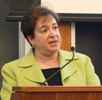An important editorial in The Washington Times about Elena Kagan, currently Solicitor General and nominee to the Supreme Court. (Thanks to Bob M. for the link.)
The article contains a classic false alternative: “Ms. Kagan’s First Amendment work repeatedly promotes the idea that speech rights are granted by government rather than inherent in the God-given nature of man.” That is, rights are either made up by the State or made up by God. But it also gives several suggestive quotations from Kagan’s writings about speech.
 “In a 1996 University of Chicago Law Review article, she argued that speech restrictions are allowable if the government’s ‘motive’ is acceptably nonideological. In dense academic prose, Ms. Kagan openly mused about the merits of ‘redistribution of expression,’ of ‘neutral regulations of speech … that are justified in terms of achieving diversity’ and of ‘disfavoring [an] idea [to] ‘unskew,’ rather than skew, public discourse.'”
“In a 1996 University of Chicago Law Review article, she argued that speech restrictions are allowable if the government’s ‘motive’ is acceptably nonideological. In dense academic prose, Ms. Kagan openly mused about the merits of ‘redistribution of expression,’ of ‘neutral regulations of speech … that are justified in terms of achieving diversity’ and of ‘disfavoring [an] idea [to] ‘unskew,’ rather than skew, public discourse.'”
More: “Ms. Kagan wrote that restrictions on corporate speech were based ‘on the ground that corporate wealth derives from privileges bestowed on corporations by the government. But this argument fails, because individual wealth also derives from government action. … The question in every case is whether the government may use direct regulation of speech to redress prior imbalances.'”
So Kagan agrees with the old Permission or Concession Theory of the Corporation, i.e., the view that corporations exist only via special permissions or concessions granted by the State, and she combines it with standard affirmative-action-for-speech principles.
By contrast, I agree with Stephen Bainbridge and Robert Hessen on the Contractual Theory of the Corporation, i.e., the view that corporations are networks of voluntary contractual relations among individuals that are recognized and protected by the government; and my essay, “Free Speech and Postmodernism,” lays out how the standard arguments for affirmative action are applied by the left and the postmoderns to speech.
Side note: Interesting to ponder that Kagan is for speech restrictions when the motive is non-ideological while those who want to revive the so-called Fairness Doctrine for talk radio and the Internet favor speech restrictions when the motive is ideological. Hmmm … .
We are a long, long way from liberal speech theory.
Update: Professor Lester Hunt: “Kagan’s Disturbing Take on Free Speech.”
This is just another example why government should be limited in size. The First Amendment was not penned to protect popular or entertaining speech. It was written to protect controversial speech. People have become so dumbed down and docile that they have lost the power and the intellect to fight for their freedoms brought to fruition by our founding fathers. Fore more information you can go to my blog or watch these videos:
http://www.youtube.com/watch?v=x-CrNlilZho
http://www.youtube.com/watch?v=VebOTc-7shU